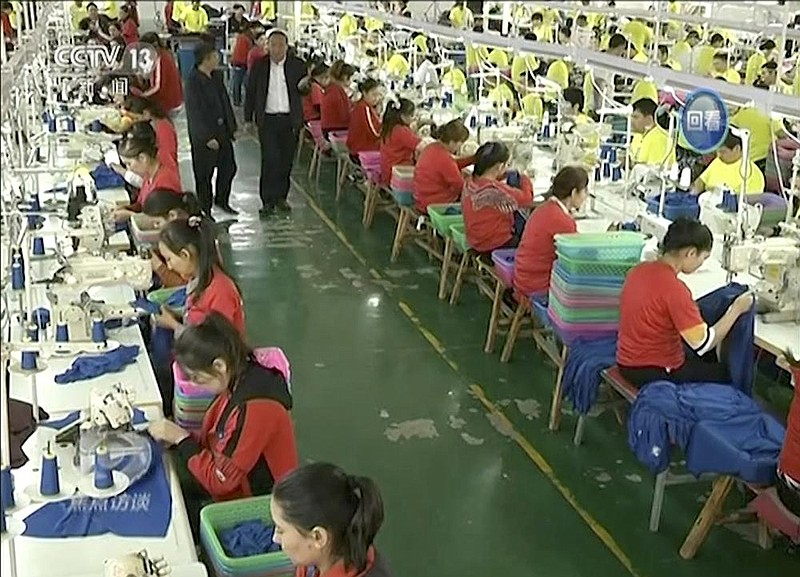BEIJING -- China on Tuesday lashed out at the passage of a bill by the U.S. House of Representatives that threatens sanctions over the alleged use of forced labor in China's Xinjiang region, calling the accusation a lie.
Foreign ministry spokesman Wang Wenbin said the bill "maliciously slandered the human rights situation in Xinjiang" and sought to curb development and progress in the region while stirring up ethnic divisions and interfering in China's internal affairs.
"The so-called problem of forced labor is totally a lie fabricated by some organizations and personnel in the United States and the West," Wang told reporters at a daily briefing.
The House voted 406-3 to declare that any goods produced in Xinjiang are presumed to be made with the forced labor of detained Uighurs and other ethnic minorities, and therefore banned from being imported to the U.S.
If enacted into law, it could force companies to avoid a region that produces 80% of the cotton in China, one of the world's top producers of the fiber, as well as tomatoes and manufactured goods.
Members of Congress say the measure is needed to press China to stop a campaign that has resulted in the detention of more than 1 million Uighurs and other predominantly Muslim ethnic groups under brutal conditions.
"If America does not speak out for human rights in China because of commercial interest, we lose all moral authority to speak about human rights anywhere in the world," House Speaker Nancy Pelosi said in defending the bill on the House floor.
Some companies and trade groups oppose a Xinjiang-wide declaration because it puts the burden on private enterprises to ensure that an often complex global supply chain is free of materials that have been produced with forced labor.
The U.S. has banned imports made with forced labor since 1930 to ensure fair trade. Enforcement has increased in recent years and U.S. Customs and Border Protection has blocked shipments by eight companies and entities operating in Xinjiang over the past year. The bill passed Tuesday would go further, shifting the burden to any company that operates in Xinjiang or buys goods from there to prove their goods are not tainted.
"It's going to require some dislocation," said Rep. Earl Blumenauer, D-Ore. "We may even pay a dime or two more for a pair of socks or a T-shirt."
But it's worth it to not be complicit in "horrific oppression," he said.
The bill was authored by Rep. Jim McGovern, D-Mass., and had dozens of co-sponsors from both parties. It now goes to the Senate for consideration.
House members also called for passage of a companion bill that would require all publicly-traded companies in the U.S. to disclose whether any of their goods or any part of their supply chain can be traced to internment camps or factories suspected of using the forced labor of ethnic minorities in China.
That bill was authored by Rep. Jennifer Wexton, D-Va., whose district is home to one of the largest Uighur communities in the U.S. A vote on that measure was put on hold, perhaps until next week.
The U.S. Chamber of Commerce opposes both bills, arguing in an letter to House members that the measures would cause companies to cease doing business in Xinjiang altogether, harming legitimate producers and manufacturers, because there is no effective way to inspect and audit suppliers in the region.
In the letter, the Chamber urged Congress to develop "targeted foreign policy tools and to work with the business community to combat these abuses."
There is strong sentiment among Republicans and Democrats to impose penalties on China amid increasingly bitter relations between the two nations over a range of issues, including trade, espionage and the coronavirus outbreak.
A nongovernmental organization, the Worker Rights Consortium, says about one in five cotton garments sold in the U.S. contain content from the Uighur region.
Republicans and Democrats have been vocal in their condemnation of China over the treatment of Uighurs and other ethnic minorities in the Xinjiang region. Since 2017, more than a million people have been swept up into vast internment camps where they are subjected to re-education programs intended to force them to assimilate into the dominant Han Chinese culture.
The Chinese government has portrayed its activities in Xinjiang as part of a campaign against a violent separatist movement and bristles at criticism of what it considers an internal manner. It says the camps are vocational training centers and denies allegations of what U.S. officials and human-rights groups say amount to slavery in the region.
President Donald Trump signed legislation in June imposing sanctions on Chinese Communist Party officials over its treatment of the Uighurs and other minorities.
Information for this article was contributed by staff members of The Associated Press.
